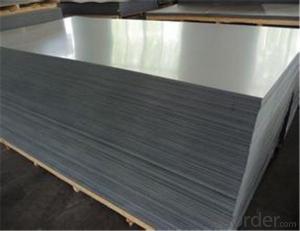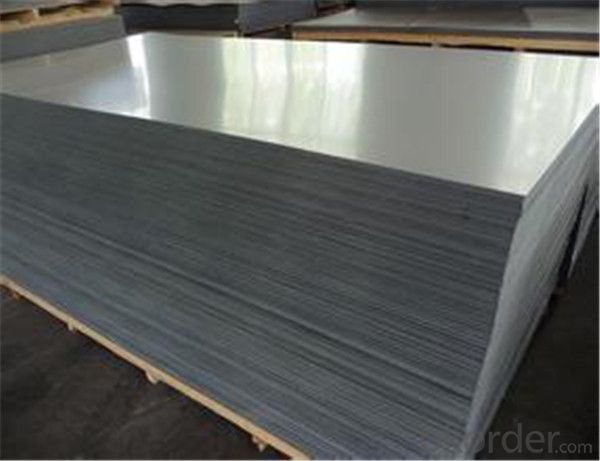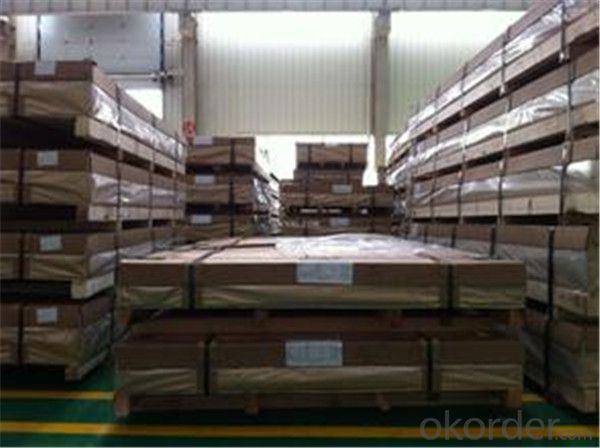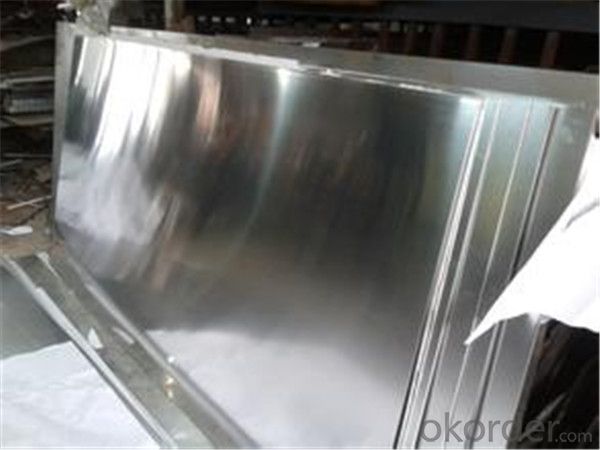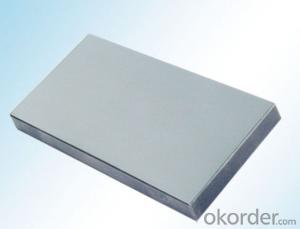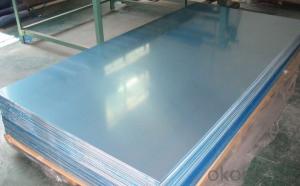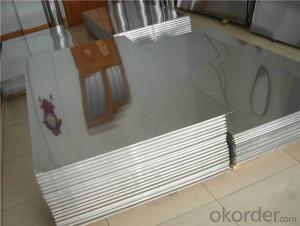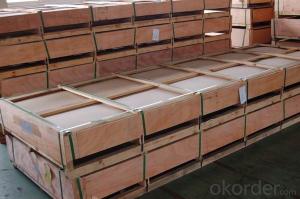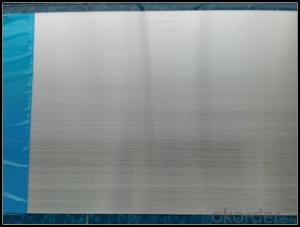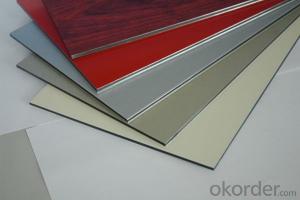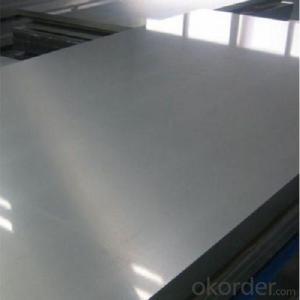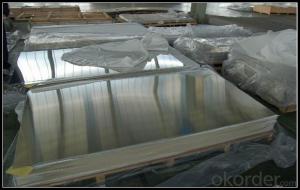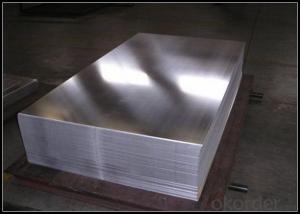4x8 Brushed Aluminum Sheets for Curtain Wall 1050 1060 H12 H14
- Loading Port:
- Shanghai
- Payment Terms:
- TT OR LC
- Min Order Qty:
- 5 m.t.
- Supply Capability:
- 10000 m.t./month
OKorder Service Pledge
OKorder Financial Service
You Might Also Like
1. specification aluminium alloy sheets/plates
Material | 1,2,3,5,6,7,8 series |
Temper | O, F, H14, H34, H32, H112, T4, T6 |
Surface treatment | Mill Finish,Anodized,Eletropharesis,Powder Coated, Wooden Finish, Polish |
Colour | Silver,Black,Red,Blue,or as required |
Length | As required |
Shape | Plainen,bossed,or as per the drawings and samples |
Fabrication | cutting,drilling,punching,bending,etc |
Tolerances | As per your requirements |
Package | inner plastic paper interleaving each piece profile,outer fixed by plywood, or as per your requirements |
Payment terms | TT |
Price terms | FOB;CIF;CNF |
Delivery time | 15-20 days after order confirmation |
Certification | ISO 9001:2008; |
Application | Decorations,Fence,Building,Aviation industry,Mechancal equipment |
Capacity | 5000 tons per month |
Min order quantity | 5 Metric ton |
Chemical Composition | %SiFeCuMnMgCrNiZnTiZrMin0.000.003.800.301.200.00 0.000.00 Max0.100.124.400.901.800.10 0.250.15
|
2. Properties:
1.High hardness, hard aluminum series.
2.Fair corrosion resistance. Heat treatable
3.Good workability. Good appearance
4.High quality and reasonable price.
5.Our product is your best choice.
3.Size
Thickness: 0.15-3.0mm(Tolerance:+/-0.02mm)
Width:150-2000MM(Tolerance:+/-1mm)
Length:600-6000MM(Tolerance:+/-1mm)
4.Products category
Thick plate | PS plate |
Oversized plate | Backing plate |
Soft alloy sheet | Contour plate |
Hard alloy sheet | Bottle caps sheets |
Equipment cabinet plate | Can lid plate |
Thread plate | Plain aluminum sheet |
Curtain wall plate | Quenched plate |
High grade plate | Pre-stretching plate |
5. Capacity of aluminum sheets/plates
Our main products are aluminum alloy materials, including aluminum alloy seamless
pipes, aluminum alloy welded pipes, aluminum alloy cold drawn pipes, aluminum alloy
extruded pipes, aluminum alloy extruded bars, aluminum alloy plates and sheets, and
aluminum alloy coils, aluminum alloy forging, etc .
Aluminum alloy Typical Mechanical Properties
Grades and status | Tensile strength (25°C MPa) | Yield Strength (25°C MPa | Hardness force 500kg 10mm | Elongation thickness 1.6mm(1/16in) |
5052-H112 | 175 | 195 | 60 | 12 |
5083-H112 | 180 | 211 | 65 | 14 |
6061-T651 | 310 | 276 | 95 | 12 |
7050-T7451 | 510 | 455 | 135 | 10 |
7075-T651 | 572 | 503 | 150 | 11 |
2024-T351 | 470 | 325 | 120 | 20 |
6. Application
Building material, insulation, shoes and tens eyes, corner beads, automotive industrial,
POP can bottle and cap, deep-proceeding case, light industry,
TV back board, PP caps, cell mask and so on.
7.Photos
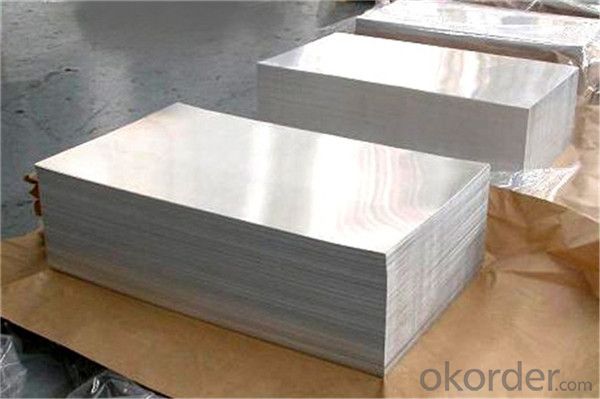
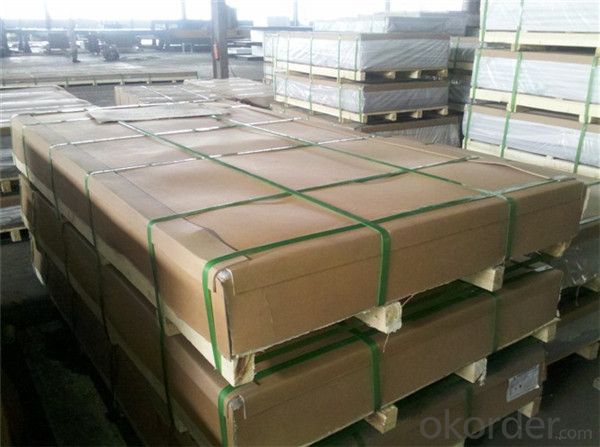
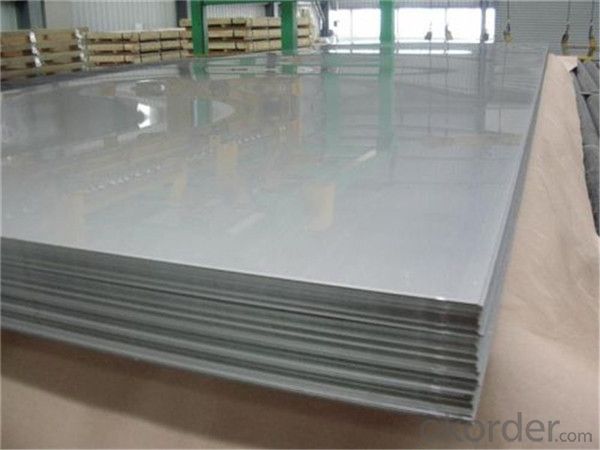
- Q: How do you ensure the surface quality of aluminum sheets?
- To ensure the surface quality of aluminum sheets, several measures can be taken: 1. Cleaning: Before any surface treatment or inspection, it is essential to thoroughly clean the aluminum sheets to remove any dirt, grease, or other contaminants. This can be done with solvents, detergents, or specialized cleaning agents. 2. Visual Inspection: Conduct a visual inspection of the surface for any visible defects like scratches, dents, or pitting. This can be done by trained personnel using proper lighting and magnification tools. 3. Chemical Treatment: Depending on the desired surface finish and application, aluminum sheets may undergo chemical treatments like anodizing, chromate conversion coating, or passivation. These processes can enhance the surface quality, corrosion resistance, and aesthetic appearance of the sheets. 4. Mechanical Polishing: Mechanical polishing techniques such as grinding, buffing, or sanding can be employed to remove surface imperfections and achieve a smooth, glossy finish. Care should be taken to ensure consistency and avoid over-polishing, which can compromise the sheet's integrity. 5. Coating and Protecting: Applying protective coatings like lacquers, paints, or powder coatings can further enhance the surface quality, appearance, and durability of aluminum sheets. These coatings act as a barrier against corrosion, abrasion, and environmental factors. 6. Quality Control: Implementing rigorous quality control procedures throughout the manufacturing process is crucial. This includes regular inspections, testing, and documentation to ensure that the surface quality of aluminum sheets meets the required standards and specifications. 7. Handling and Packaging: Proper handling and packaging during transportation and storage are essential to prevent any surface damage. Adequate protective measures such as using protective films, paper interleaves, or cushioning materials can be employed to safeguard the surface quality until the sheets reach their final destination. By following these measures, manufacturers can ensure the surface quality of aluminum sheets, meeting the desired specifications and customer expectations.
- Q: What is the coefficient of expansion for aluminum sheets?
- The coefficient of expansion for aluminum sheets is roughly 0.000022 per degree Celsius, indicating that the aluminum sheet will expand by 0.000022 times its original length with every degree Celsius rise in temperature. It is crucial to take this coefficient of expansion into account in situations where the aluminum sheets may encounter fluctuating temperatures, as it can impact the material's overall dimensions and stability.
- Q: Can aluminum sheets be used for balcony railings?
- Yes, aluminum sheets can be used for balcony railings. Aluminum is a popular material for balcony railings due to its lightweight nature, durability, and resistance to corrosion. It is a versatile material that can be easily formed into different shapes and designs, making it suitable for various architectural styles. Additionally, aluminum railings require minimal maintenance and can withstand harsh weather conditions, making them a practical and long-lasting choice for balcony railings.
- Q: What are the colors of iron sheet and aluminum sheet?
- they are both silver white.
- Q: What are the specific rules or benchmarks that must be followed when utilizing aluminum sheets for construction purposes?
- <p>Yes, there are special regulations and standards for using aluminum sheets in construction projects. These include material specifications, thickness, and strength requirements as per the American Society for Testing and Materials (ASTM) standards, such as ASTM B209 for aluminum sheet and plate. Additionally, the International Building Code (IBC) and local building codes provide guidelines for the use of aluminum in construction. These standards cover aspects like fire resistance, structural integrity, and weather resistance. Compliance with these regulations ensures safety, durability, and compliance with construction laws.</p>
- Q: What advantages does the ceramic panel curtain wall have compared with the aluminum sheet and stone curtain wall?
- Metal plate curtain wall deformation resistance is poor, the plate strength and steel are not high enough, waterproof sealing performance is not good enough, easy to fade, deformation, also can cause light pollution. Construction and installation technical requirements are relatively high.Stone curtain wall is now used most, but more stereotyped, and negative news constantly, stone fell, heavy stones, high-rise building exterior wall of high risk, poor fire performance.
- Q: Aluminum plate thickness 3 mm, what is the allowable error in the national standard thickness?
- The allowable deviation of plate thickness in GB/T3880.3-2006 "general industrial aluminum plate, strip and Aluminum Alloy third part:" size deviation provisions, I have the standard download URL sent to you a message, please check.The deviation is divided into ordinary and high level, +0.10, -0.12
- Q: Are aluminum sheets suitable for food storage containers?
- Yes, aluminum sheets are suitable for food storage containers. Aluminum is a lightweight and versatile metal that is commonly used for food packaging and storage. It is non-toxic, non-reactive, and does not impart any taste or odor to the food stored in it. Aluminum containers are also resistant to corrosion, which helps to keep the food fresh and prevent any contamination. Additionally, aluminum is a good conductor of heat, allowing for efficient cooling or heating of the food. It is also recyclable, making it an eco-friendly choice for food storage containers. Overall, aluminum sheets are a popular and reliable option for storing food safely and effectively.
- Q: Is it possible to use adhesive instead of fasteners to bond aluminum sheets to a structure?
- <p>Yes, you can use an adhesive to attach aluminum sheets to a structure. However, it's important to choose an adhesive that is specifically designed for bonding aluminum, as not all adhesives provide the necessary strength and durability. Structural adhesives that are compatible with aluminum can offer a strong bond and are often used in applications where a clean, seamless appearance is desired or where fasteners are not suitable. It's crucial to ensure that the adhesive is resistant to the environmental conditions the structure will be exposed to, such as moisture, temperature fluctuations, and UV radiation. Always follow the manufacturer's instructions for surface preparation and application to achieve the best results.</p>
- Q: Are 101 aluminum sheets suitable for medical equipment?
- No, 101 aluminum sheets are not suitable for medical equipment. Medical equipment requires materials that are highly durable, corrosion-resistant, and have excellent biocompatibility. While 101 aluminum is a strong and versatile alloy, it does not possess the necessary characteristics for medical equipment. Instead, medical equipment manufacturers typically use specialized alloys such as stainless steel or titanium, which offer superior strength, resistance to corrosion, and compatibility with the human body. It is essential to prioritize the safety and effectiveness of medical equipment by selecting appropriate materials that meet the specific requirements of the healthcare industry.
Send your message to us
4x8 Brushed Aluminum Sheets for Curtain Wall 1050 1060 H12 H14
- Loading Port:
- Shanghai
- Payment Terms:
- TT OR LC
- Min Order Qty:
- 5 m.t.
- Supply Capability:
- 10000 m.t./month
OKorder Service Pledge
OKorder Financial Service
Similar products
Hot products
Hot Searches
Related keywords
